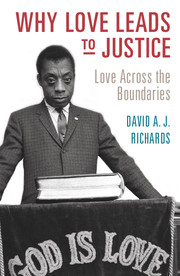Book contents
- Frontmatter
- Dedication
- Epigraph
- Content
- Acknowledgments
- Introduction: Love Resists Injustice
- 1 Breaking the Love Laws as Resistance
- 2 Benjamin Britten and Peter Pears: Love and Resistance
- 3 Christopher Isherwood's Struggle for a Resistant Voice
- 4 Wystan Auden on the Anxiety of Manhood
- 5 Bayard Rustin on Nonviolence
- 6 James Baldwin on Love and Voice
- 7 Eleanor Roosevelt, Margaret Mead, and Ruth Benedict on Resisting Patriarchy
- Conclusion: Moral Injury and Love: Why Love Leads to Justice
- Bibliography
- Index
6 - James Baldwin on Love and Voice
Published online by Cambridge University Press: 05 November 2015
- Frontmatter
- Dedication
- Epigraph
- Content
- Acknowledgments
- Introduction: Love Resists Injustice
- 1 Breaking the Love Laws as Resistance
- 2 Benjamin Britten and Peter Pears: Love and Resistance
- 3 Christopher Isherwood's Struggle for a Resistant Voice
- 4 Wystan Auden on the Anxiety of Manhood
- 5 Bayard Rustin on Nonviolence
- 6 James Baldwin on Love and Voice
- 7 Eleanor Roosevelt, Margaret Mead, and Ruth Benedict on Resisting Patriarchy
- Conclusion: Moral Injury and Love: Why Love Leads to Justice
- Bibliography
- Index
Summary
If vocation and love are the two questions that must be faced in a well-lived life, Bayard Rustin and James Baldwin shared both a vocation, finding a voice of ethical resistance to the racism that afflicted them as black men, and struggling to find a voice as well for loving gay relationships, including relationships with white men. Both found it easier to voice their resistance to racism, even though their gay loving relationships gave rise to the remarkably creative voices of each man as leaders in resisting American racism, as I have already shown in the case of Rustin and will now show for Baldwin. Only at the end of their lives do both men give voice to gay rights. Both men were raised in loving relationship to maternal caretakers, and religion was an important force in their lives. However, whereas Rustin drew inspiration from anti-patriarchal Quakerism, Baldwin's voice, as an artist resisting racism, developed in resistance to the Baptist patriarchal religion of his tyrannical and violent stepfather. Baldwin's artistic voice arose in trying to understand the violence of his father's religion that regarded all whites as evil and all blacks as good, which Baldwin saw as connected to the role patriarchy played in shaping the sexuality and sense of manhood of black men. In coming to terms with these issues both as a black and gay man, Baldwin's novels and essays explored the intrapsychic structure of the propensities to violence, in both white and black men, arising from patriarchy. It is the central subject of both his essays and novels. Because Baldwin had experienced so much violence from his stepfather, his struggle for resisting voice was, I believe, much more difficult and fraught than that of Bayard Rustin. Baldwin always had the love of his mother, but she had eight additional children with Baldwin's stepfather, who clearly preferred his natural children.
- Type
- Chapter
- Information
- Why Love Leads to JusticeLove across the Boundaries, pp. 150 - 181Publisher: Cambridge University PressPrint publication year: 2015



